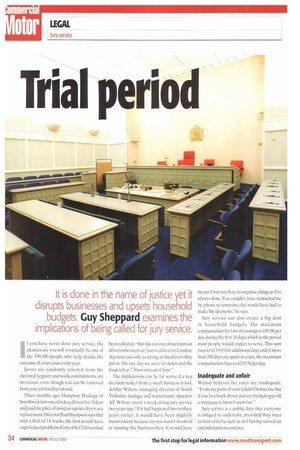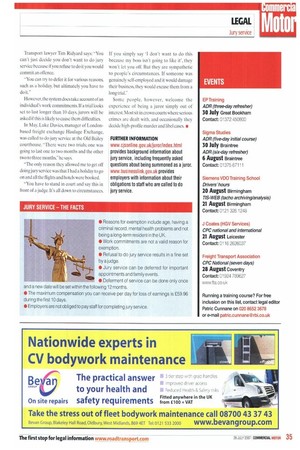Trial period
Page 34

Page 35

If you've noticed an error in this article please click here to report it so we can fix it.
f you have never done jury service, the chances are you will eventually be one of the 390,000 people who help decide the outcome of court cases every year.
Jurors are randomly selected from the electoral register and work commitments are no excuse, even though you can be removed from your job for days on end.
Three months ago. Hampson Haulage of Smethwick lost one of its key drivers for 10 days and paid the price of using an agency driver as a replacement.Director Paul Hampson says that with a fleet of 15 trucks, the firm would have experienced problems if any of its 12 drivers had been called up. "But this was one of our contract drivers who starts at 3am to deliver to London. Agencies are only as strong as the drivers they put in. On one day we were let down and the truck left at 7.30am instead of 3am."
The implications can he far worse if a key decision maker from a small business is lost. Arthur Wilson, managing director of South Yorkshire haulage and maintenance operator AE Wilson, spent a week doing jury service two years ago."If it had happened two to three years earlier, it would have been mightily inconvenient because my son wasn't involved in running the business then. It would have meant I was not, here to organise things as I've always done. You couldn't have contacted me by phone so someone else would have had to make the decisions,he says.
Jury service can also create a big dent in household budgets. The maximum compensation for loss of earnings is £59.96 per day during the first 10 days. which is the period most people would expect to serve. This sum rises to £119.93 for additional days and, if more than 200 days are spent in court, the maximum compensation rises to £210.54 per day.
Inadequate and unfair
Wilson believes the rates are inadequate. -From my point of view it didn't bother me, but if you're a truck driver and are trying to pay off a mortgage it doesn't seem fair."
Jury service is a public duty that everyone is obliged to undertake, provided they meet certain criteria such as not having served an extended prison sentence. Transport lawyer Tim Ridyard says: "You can't just decide you don't want to do jury service because if you refuse to do it you would commit an offence.
-You can try to defer it for various reasons, such as a holiday, but ultimately you have to do it."
However, the system does take account of an individual's work commitments. If a trial looks set to last longer than 10 days, jurors will be asked if this is likely to cause them difficulties.
In May, Luke Davies, manager of Londonbased freight exchange Haulage Exchange, was called to do jury service at the Old Bailey courthouse. "There were two trials; one was going to last one to two months and the other two to three months," he says.
"The only reason they allowed me to get off doing jury service was that I had a holiday to go on and all the flights and hotels were booked.
"You have to stand in court and say this in front of a judge. It's all down to circumstances. If you simply say `I don't want to do this because my boss isn't going to like it', they won't let you off. But they are sympathetic to people's circumstances. If someone was genuinely self-employed and it would damage their business, they would excuse them from a long trial."
Some people, however, welcome the experience of being a juror simply out of interest. Most sit in crown courts where serious crimes are dealt with, and occasionally they decide high-profile murder and libel cases. •
























































































































































































